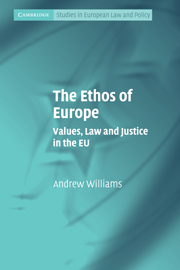7 - The institutional ethos of the EU
Published online by Cambridge University Press: 05 June 2012
Summary
Introduction
Phillip Allott, a renowned if idiosyncratic theorist of international law, once claimed that the EU lacked ‘an arche’, ‘a coherent idea of its actuality, an ideal of its potentiality’. In terms of its politics and its law, he seemed to suggest a philosophical void accompanied its development. But even whilst taking pains to itemise the failings that demonstrated this absence and the general inability to find a ‘self-constituting ideal’, Allott remained optimistic about the EU's future. What was needed was an awakening of ‘l’âme et la personne de l'Europe from its sad self-induced sleep'. Then the promise of the EU might be fulfilled.
Allott's militant optimism, as his form of positive but severe critique might be called, typifies much of the ultimately friendly analyses of the EU. There are, however, two problems with his position. First, it assumes there is some form of ‘soul’ hidden in the popular consciousness of the ‘people’ of Europe that awaits rediscovery and which would define the point and nature of European unification. Second, it assumes that no operative philosophy other than one that is the product of a European society or general social movement is possible. Although I share Allott's optimism and much of his practical critique I do not accept either of these mistaken assumptions. Instead, this book provides an alternative vision that remedies Allott's double error. It claims that a form of constituting ideal has arisen but is manifest not through a popular consciousness but through an institutional ethos.
- Type
- Chapter
- Information
- The Ethos of EuropeValues, Law and Justice in the EU, pp. 242 - 282Publisher: Cambridge University PressPrint publication year: 2010



